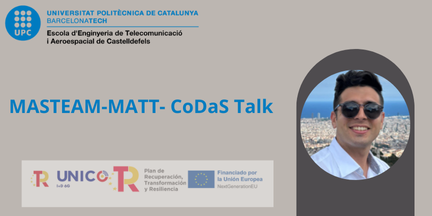Exploring Deep Reinforcement Learning for RAN-level slice admission control in 5G/6G: Centralized and Federated approaches within the O-RAN Framework
20/09/2024
Next MASTEAM-MATT-CoDaS talk from Mario José Martínez. Wednesday 25th September2024, 18:00h. Classroom C4-021B EETAC, and online by Meet. Campus Castelldefels, UPC
 The EETAC Master's degrees in Applied Telecom. and Engineering Management (MASTEAM), Advanced Telecommunications Technologies (MATT), and Erasmus Mundus master's degree in Communications, Engineering and Data Science (CoDaS) organize a weekly series of activities (talks, technical visits, discussion pannels) that complement the academic activities with real-world experiences from companies, research centres and institutions in the main topics of the master: Machine Learning, Data Science, Internet of Things, Smart Cities, 5G mobile communications, Software-Defined Networking (SDN) and Radio (SDR), cloud computing, augmented reality and audiovisual services, among others.”
The EETAC Master's degrees in Applied Telecom. and Engineering Management (MASTEAM), Advanced Telecommunications Technologies (MATT), and Erasmus Mundus master's degree in Communications, Engineering and Data Science (CoDaS) organize a weekly series of activities (talks, technical visits, discussion pannels) that complement the academic activities with real-world experiences from companies, research centres and institutions in the main topics of the master: Machine Learning, Data Science, Internet of Things, Smart Cities, 5G mobile communications, Software-Defined Networking (SDN) and Radio (SDR), cloud computing, augmented reality and audiovisual services, among others.”
This week's activity will be a talk session from Mario José Martínez
Title: "Exploring Deep Reinforcement Learning for RAN-level slice admission control in 5G/6G: Centralized and Federated approaches within the O-RAN Framework"
Abstract:As wireless communication technologies transition from 5G to 6G, the growing demands for multiconnectivity and real-time services will require innovative architectural approaches. Machine Learning (ML), and more specifically Deep Reinforcement Learning (DRL), are being explored as a promising solution to these challenges. This talk will present how DRL, and particularly Deep Q-Networks (DQN), can be applied for dynamic resource allocation and management within the O-RAN framework, focusing on RAN slicing and admission control. These models, implemented as Extended Applications (xApps), are expected to optimize resource utilization while ensuring Quality of Service (QoS).
In addition to DQN and other DRL algorithms, the presentation will introduce Federated Learning (FL) and Federated Deep Reinforcement Learning (FDRL) as crucial components for enhancing distributed decision-making in high-mobility scenarios. The speaker will describe the solution proposed by his research group as part of the OPENG6G project, which aims to automate network management through AI-driven resource control and anomaly detection mechanisms. The talk will also cover the centralized stage of this solution, already developed for the O-RAN environment, and outline the federated stage currently in development, which will further advance the efficiency and scalability of network operations.
These technologies are being used and developed in the OPEN6G project. The Open6G coordinated project -Open RANs for Revolutionary 6G Systems- conducts applied research on open RANs currently underway with the goal of designing and developing a 6G-based open test platform for the new network and sensing applications related to smart surfaces.
Bio: Mario José Martínez Morfa is an Associate Researcher at Universitat Politècnica de Catalunya (UPC) since 2023, being part of the Design and Evaluation of Broadband Networks and Services (BAMPLA) research group of the Department of Network Engineering. He holds a Bachelor degree in Telecommunications & Electronics Engineering from Universidad Central de Las Villas (Cuba), and a Master’s degree in Applied Telecommunications and Engineering Management (MASTEAM) from the Castelldefels School of Telecommunications and Aerospace Engineering (EETAC) of the UPC. His research involves the study of Machine Learning algorithms for the optimization and resource management of 5G and 6G networks, as part of the OPEN6G project. He is also part of the group in charge of the management of fixed, mobile and optical networks, as well as the deployment of edge computing nodes, as part of projects such as 6G-OPENLAB and ELEGANT.
When: Wednesday 25th Sept 2024, 18:00h
Where: Classroom C4-021B. How to arrive
Link to the recorded version of the session






Comparteix: